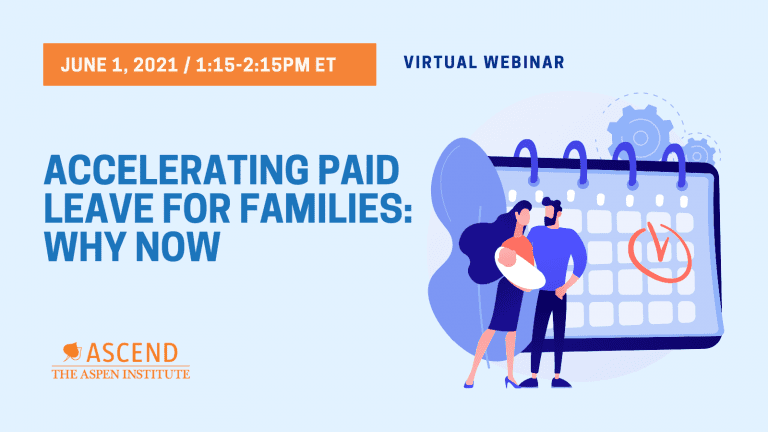Family Prosperity: Value All Care, Value Every Family
“I found myself sitting in a cubicle at work, while my son is in the hospital really fighting for his life, and that’s a decision that no parent should have to make.” – Britta, a mother featured in the Zero Weeks documentary.
Times are changing rapidly for families—our households, work and the workforce do not look like they did just a decade ago. Challenges and barriers for parents continue to grow – skyrocketing costs of health care and child care, lack of flexibility at the workplace, and less time at home. Working parents have to balance their budget and time across an ever-changing landscape of needs: from caring for themselves, their children, and older family members, to affording quality child care and paying household bills. Removing barriers so families can care for their loved ones requires us to rethink and update the supports in place for working parents to keep up with the realities of a changing workforce.
There are many family-supportive policies that policymakers and businesses can implement to help ensure that families have access to the time and resources needed to thrive – such as paid family and medical leave, quality child care, health insurance, mental health and lactation supports for new mothers, and federal levers such as the Supplemental Nutrition Assistance Program (SNAP) and Temporary Assistance for Needy Families (TANF), among others. The Aspen Family Prosperity Innovation Community (Family Prosperity) is bringing together policy, practice, business, research, and community leaders to look at the leading-edge ways policies and supports like these can improve economic and health opportunities and outcomes for families in the United States, especially those with low incomes.
Many people will need to take time off to care for a loved one at some point in their lives. Yet only 15 percent of workers in the U.S. have access to paid family and medical leave through their employers. And this benefit is disproportionately available to wealthier people: in the lowest quarter of wage-earners, 93 percent of people work in jobs that don’t provide paid family leave. Individuals with low incomes report having less access to paid leave or support from their employers, and are less likely to be able to afford time off than those with mid- to high-income earnings.
All workers benefit from paid family and medical leave policies – not just those with a new child. It is for people who are fighting a serious illness like cancer, those from military families affected by deployment or injury, or individuals who need to take time off to care for a sick or elderly family member. We are in the midst of an unprecedented elder boom, and about 80 percent of elderly people receive care from family members.
Paid leave policies are part of the economic and social fabric of a healthy economy. And when those supports are not in place, the economy suffers. Working families in the United States lose out on at least $28.9 billion in lost wages annually because they lack access to affordable child care and paid family and medical leave. Families, and women in particular, also experience long-term economic effects, including lower labor force participation and reduced lifetime earnings as a result of time taken out of the labor force.
Family Values @ Work (FV@W) recently held their 15th Annual Meeting in Detroit, MI. FV@W, a Family Prosperity Partner, is a network of 27 states that fosters paid family and medical leave grassroots coalitions and policy change in locations around the country. The meeting brought together organizers, employers, activists, and philanthropists from around the country to discuss the encouraging paid leave policy wins in the past year (three states and the District of Columbia passed paid family and medical leave policies in the past year), how these policies factored into the midterm elections, and how businesses are providing these supports for their employees.
Public and political support for paid family leave policies is gaining steam. According to a recent analysis by the National Partnership for Women and Families – another Family Prosperity Partner – the 2018 midterm elections saw record numbers of winning candidates in competitive races embrace equal pay, paid leave, and related issues. Fifty percent of all gubernatorial and congressional candidates in competitive races included at least one of five workplace issues – equal pay, paid family leave, sexual harassment, paid sick days or pregnancy discrimination – in their platforms. And candidates whose platforms included paid family leave as a standalone issue or in combination with other issues were 14 percent more likely to win.
Employers have a unique opportunity to catalyze change and lead our country into a new era. Providing benefits like paid leave, child care support, scheduling flexibility, and health insurance for their employees leads to a more productive, stable workforce. Offering paid leave can help businesses retain talented people and cut down on the costs of hiring and training new employees. Small businesses like Bright Start Early Care Bilingual Center in Washington, DC, and the Red Hen Baking Company in Burlington, Vermont, have found creative ways to offer paid leave to their employees.
And in cities and states with paid leave policies in place, large majorities of employers are supportive. For example, a Center for Economic and Policy Research study found that 86 percent of employers in New York express support for the paid sick leave law two years after implementation, and according to a recent Ernst & Young poll, over 90 percent of employers offering paid leave reported the policy to be neutral or positive both in terms of employee performance as well as operational considerations.
As Wendy Chun-Hoon, FV@W’s co-director, said at the Annual Meeting: “Value all care, and value every family.” Having the time, opportunity, and support to care for a loved one in need is necessary for families to prosper. And when America’s families thrive, so does our country. Stay tuned for more from Family Prosperity, as we release a portfolio of innovative strategies and solutions in 2019.
Related Posts














